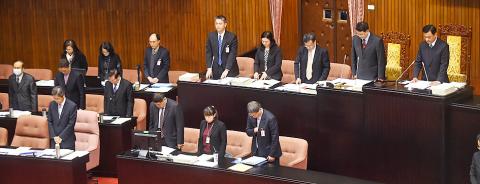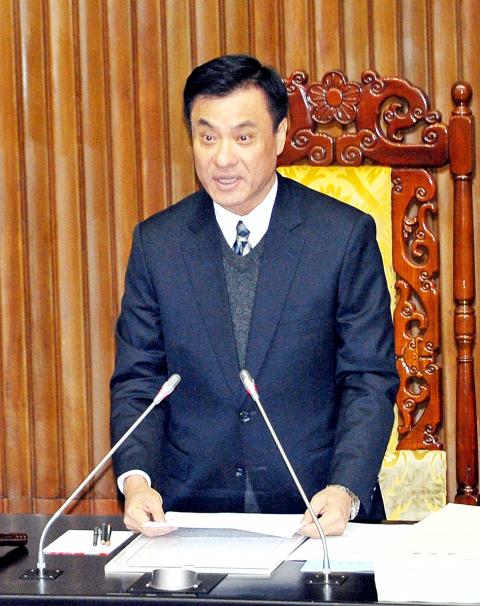The new legislative plenary session opened yesterday, with the Chinese Nationalist Party (KMT), reduced to a minority party after its election rout, blocking draft bills on “ill-gotten party assets” proposed by the Democratic Progressive Party.
The session commenced with Legislative Speaker Su Jia-chyuan (蘇嘉全) leading the legislature and Executive Yuan officials in observing a moment of silence for those who lost their lives in Tainan in the earthquake that struck on Feb. 6.
More than 100 draft acts sailed through their first readings and were referred to legislative committees for review and deliberation during the morning meeting, including draft bills on governing political parties; amendments to the Referendum Act (公民投票法) and the Disaster Prevention and Protection Act (災害防救法); setting up reciprocal offices with China; and the much-discussed legislation on the presidential transition of power.

Photo: Liu Hsin-de, Taipei Times
What did not get through were four bills aiming to deal with ill-gotten party assets proposed by DPP lawmakers, which the KMT caucus opposed and were sent back to the Procedure Committee.
KMT caucus whip Lin Te-fu (林德福) said the regulation of political parties’ assets could be included in the proposed political party act, adding that the KMT opposed the DPP’s bills because they are “apparently targeting [the KMT].”
DPP Legislator Su Chih-fen (蘇治芬) blasted the KMT’s move on Facebook, saying the KMT “still does not understand why it has been spurned by the public even after its 2014 and 2016 electoral routs.”

Photo: CNA
“The political party act is to ensure a fair playing field for all political parties, and the premise for that fairness depends on the act governing ill-gotten party assets stripping away the competitive advantage that the KMT has held for a long time,” Su Chih-fen said.
The DPP, which now holds a majority in the legislature, can choose to counteract the KMT’s move if it is “determined to propose the bill,” Social Democratic Party spokesperson Miao Po-ya (苗博雅) said, adding that according to legislative regulations, a caucus can only block the referral of a bill to a committee when “there are too few lawmakers present to conduct a vote.”
“In other words, if the DPP appoints a sufficient number of lawmakers to attend the first-reading meeting ... the bills could be successfully referred to the committee for review,” Miao added.
Meanwhile, Lin said prior to the general assembly meeting that the KMT caucus does not and would not oppose legislation on the transition of power, but the legislation must not be unconstitutional.
The draft act will not be reviewed until at least the end of next month or the beginning of April after a question-and-answer session, “so the third reading will probably be completed only after the [May 20] presidential transition,” he said.
“Since the proposed bill will not be in effect for this transition, we should take time to review the bill. The most important thing is not to ensure that it does not go against the Constitution, as the version proposed by [the DPP] does in some parts,” Lin added.
KMT Legislator Alicia Wang (王育敏) said the DPP’s version of the legislation, which would restrict the incumbent president’s appointment and decisionmaking powers, would generate controversies, and that since a president is elected to a full four-year term, resigning before their time is up or reducing their effective ruling time is unlawful.
DPP Legislator Wu Ping-jui (吳秉叡) disagreed, asking why “the KMT, when it proposed its version of the presidential transition bill in 2008, which was little different from the one we have now, did it not find it unconstitutional?”

MAKING WAVES: China’s maritime militia could become a nontraditional threat in war, clogging up shipping lanes to prevent US or Japanese intervention, a report said About 1,900 Chinese ships flying flags of convenience and fishing vessels that participated in China’s military exercises around Taiwan last month and in January last year have been listed for monitoring, Coast Guard Administration (CGA) Deputy Director-General Hsieh Ching-chin (謝慶欽) said yesterday. Following amendments to the Commercial Port Act (商港法) and the Law of Ships (船舶法) last month, the CGA can designate possible berthing areas or deny ports of call for vessels suspected of loitering around areas where undersea cables can be accessed, Oceans Affairs Council Minister Kuan Bi-ling (管碧玲) said. The list of suspected ships, originally 300, had risen to about

DAREDEVIL: Honnold said it had always been a dream of his to climb Taipei 101, while a Netflix producer said the skyscraper was ‘a real icon of this country’ US climber Alex Honnold yesterday took on Taiwan’s tallest building, becoming the first person to scale Taipei 101 without a rope, harness or safety net. Hundreds of spectators gathered at the base of the 101-story skyscraper to watch Honnold, 40, embark on his daredevil feat, which was also broadcast live on Netflix. Dressed in a red T-shirt and yellow custom-made climbing shoes, Honnold swiftly moved up the southeast face of the glass and steel building. At one point, he stepped onto a platform midway up to wave down at fans and onlookers who were taking photos. People watching from inside

Japan’s strategic alliance with the US would collapse if Tokyo were to turn away from a conflict in Taiwan, Japanese Prime Minister Sanae Takaichi said yesterday, but distanced herself from previous comments that suggested a possible military response in such an event. Takaichi expressed her latest views on a nationally broadcast TV program late on Monday, where an opposition party leader criticized her for igniting tensions with China with the earlier remarks. Ties between Japan and China have sunk to the worst level in years after Takaichi said in November that a hypothetical Chinese attack on Taiwan could bring about a Japanese

The WHO ignored early COVID-19 warnings from Taiwan, US Deputy Secretary of Health and Human Services Jim O’Neill said on Friday, as part of justification for Washington withdrawing from the global health body. US Secretary of State Marco Rubio on Thursday said that the US was pulling out of the UN agency, as it failed to fulfill its responsibilities during the COVID-19 pandemic. The WHO “ignored early COVID warnings from Taiwan in 2019 by pretending Taiwan did not exist, O’Neill wrote on X on Friday, Taiwan time. “It ignored rigorous science and promoted lockdowns.” The US will “continue international coordination on infectious